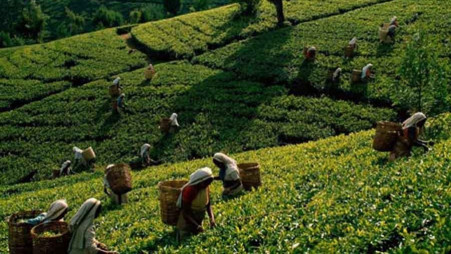Covid-19 reaches Sylhet tea garden workers
Around 1.5 lakh workers are engaged in 166 tea gardens across the country

During the government announced holidays, all offices and activities were halted across the country. But regular activities at the tea gardens continued. And the workers had to participate in their regular duties every day, amid the holidays.
Considering the health risks, the tea workers' organisations have demanded several times to stop the activities in tea gardens. But the concerned people did not pay heed to the demands.
The tea estate owners and authorities explained that the gardens were protected areas, not accessible to outsiders. And thus, there are fewer risks of a Covid-19 outbreak there.
However, the novel coronavirus has infected the tea garden workers, finally.
At least seven tea garden workers and their family members have tested coronavirus positive so far in different gardens of Sylhet division.
Two of them have died. And in the last three months, it was found that two more tea garden workers have died with Covid-19 symptoms.
However, Afzal Rashid, an entrepreneur in the tea industry and president of the Sylhet Metropolitan Chamber of Commerce, said, "Almost all of those who have been identified as Covid-19 positive in the tea garden, have come from outside. They were affected either by themselves or from their family members. There are no reports of anyone being infected while working in the garden."
Around 1.5 lakh workers are engaged in 166 tea gardens in the country. Almost all of the workers belong to minor ethnic groups and work in the garden for a minimum wage.
In Sylhet division, there are 134 tea gardens.
Two women at Kapnapahar tea garden were the latest Covid-19 positive patients in Juri upazila of Moulvibazar. They were identified as coronavirus positive on June 25. And they are mother-in-law and daughter-in-law in relationship. Now, they are under home isolation.
On April 26, a college student from a tea worker family in Srimangal was identified as coronavirus positive.
The baby of a tea worker of Chondichharain Chunarughat upazila of Habiganj died on April 25 after being infected with Covid-19.
On May 23, two workers of Rajki Bagan under Juri upazila were identified as Covid-19 positive. And in May last, an elderly worker of Sanchhara garden in Kamalganj died from coronavirus.
Regarding the death of the baby of a tea garden worker in Chunarughat due to Covid-19, Upazila Nirbahi Officer (UNO) Satyajit Ray Das said, "Two, including the baby, were infected by novel coronavirus not because they were working in the garden, but because they were in Dhaka."
The child was also diagnosed with cancer, he added.
Md Shah Alam, chairman of Bangladesh Chaa Sangsad, said that the entry of outsiders was banned in all tea gardens to prevent the outbreak of Covid-19.
"We ask everyone to stay clean. Also, the tea garden workers are provided with masks, soap and other protective equipment," he said.
He further said that the tea workers have been asked to work while maintaining social distancing. The workers are abiding by it.
"The business of tea is already witnessing a fall. If the leave is enforced, production will stop. And also it will impact the workers. The government also did not provide any instructions to announce holidays in the tea gardens," said Shah Alam.
Raju Gowala, president of the Sylhet valley tea workers' union, said many people had to go out of the gardens at different times.
"After meeting the needs in town, they return to the family in the garden. People who work outside can also spread the virus among their family members in the garden. Furthermore, social distancing is not maintained very strictly in the garden. Consequently, if anyone in the garden is infected, it can spread among others there.
Rambhajan Koiri, central president of the organisation, said, "Most of the tea-gardens do not prioritise the safe distancing issues. They also did not provide hand washing soap and masks to the workers. These workers are working in an atmosphere of risk."



 Keep updated, follow The Business Standard's Google news channel
Keep updated, follow The Business Standard's Google news channel
















